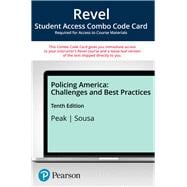A "learn by doing" approach to what works in policing today
Based on the authors' many years of practical and academic experience, Revel® Policing America: Challenges and Best Practices addresses the greatest challenges in the field today, from policing a diverse society to responding to calls for reexamining policing methods. By challenging readers to vicariously experience the job of the officer, the authors lend a real-world take reflective of the changing times we live in. Throughout the 10th edition, the theme of "what works" is reinforced in new cases, new exercises, and updated information, as well as in opportunities to think critically, problem-solve, and prepare to meet the challenges of policing in our age.
NOTE: This Revel Combo Access pack includes a Revel access code plus a loose-leaf print reference (delivered by mail) to complement your Revel experience. In addition to this access code, you will need a course invite link, provided by your instructor, to register for and use Revel.











